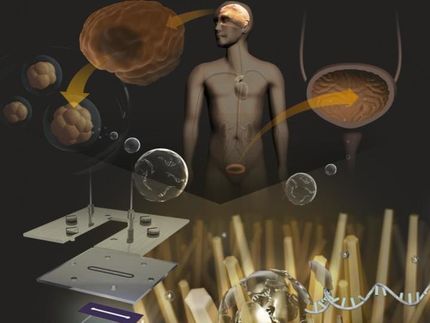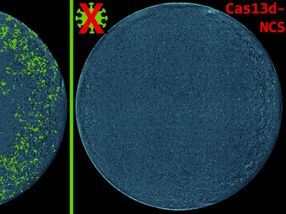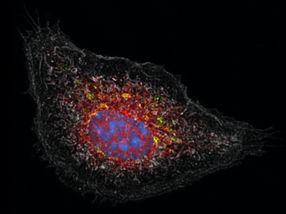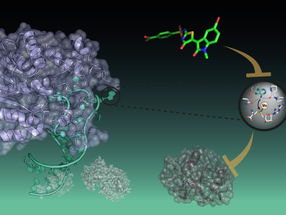Novel Antibody against Brain Tumors
Scientists of Helmholtz Zentrum München and the Munich University Hospital (LMU) are developing a novel antibody to treat brain tumors. Now, with funding amounting to EUR 3.5 million approved by the Federal Ministry of Education and Research (BMBF) and the Helmholtz Validation Fund, the molecule shall undergo the first phase of clinical testing.
Glioblastoma is a very aggressive type of brain tumor. As a rule the cancer tissue is surgically removed as far as possible and the patient receives radiotherapy and/or chemotherapy. Nevertheless, due to the remaining cancer cells in the brain, the average survival time after diagnosis is only a few months. A team of scientists led by Prof. Dr. Reinhard Zeidler, research group leader in the Research Unit Gene Vectors at Helmholtz Zentrum München and the Department of Otolaryngology of the Munich University Hospital (LMU) seeks to improve the treatment by means of a novel antibody.
Deadly delivery for tumor cells
The molecule named 6A10 specifically binds to the enzyme carbonic anhydrase XII, which is only found on cancer cells but not on healthy brain cells. It thus has two effects: first, it directly inhibits the enzyme, which is of great importance for the fast-growing tumor cells. Second, the antibody is conjugated with lutetium-177, an isotope that is lethal for the tumor cells. The heavy metal is a beta-ray emitter and damages the cells in its immediate surroundings. Via the antibody, it reaches the remaining tumor cells directly.
Action at the tumor site
To deliver the antibody as highly concentrated as possible and as close as possible to the tumor site, the scientists plan to inject it directly at the site of the removed tumor tissue. By doing so, Zeidler and his partners Professor Hans-Jürgen Reulen, Professor emeritus of Neurosurgery at Munich University Hospital, and Dr. Franz-Josef Gildehaus from the Department of Nuclear Medicine at Munich University Hospital hope to delay or even prevent the recurrence of the disease. “Together we have established a competent network of molecular biologists, neurosurgeons, nuclear medicine specialists, radiation physicist and radiopharmacists,” said project leader Zeidler. Both, the Department of Neurosurgery (director: Professor Tonn) and the Department of Nuclear Medicine (director: Professor Bartenstein) will play an important role in the planned clinical trials.
In the first phase, Zeidler and his colleagues want to lay the foundation for the clinical testing: “First, this involves proper production of the antibody in compliance with the mandatory law on drugs for human use.” This will be followed by the first tests on patients. As is usual in this phase, the scientists expect the initial study to have 12-15 participants who will receive the active agent.
“Our hope is that in the long term we can develop a new treatment option for glioblastoma patients” said Zeidler, looking ahead at the future. In addition to the hope of developing a successful treatment for brain tumors, Zeidler and his colleagues have their sights on other types of tumors. Since the target molecule carbonic anhydrase XII is also overexpressed in other cancer cells, it is conceivable that the molecule could be used against other forms of tumors such as lung cancer, according to the scientists.
„We hope that our project will serve as a good example that, also in an academic context, funding can help to bring scientific results from bench to bedside,” said project leader Zeidler.
Most read news
Other news from the department science

Get the life science industry in your inbox
From now on, don't miss a thing: Our newsletter for biotechnology, pharma and life sciences brings you up to date every Tuesday and Thursday. The latest industry news, product highlights and innovations - compact and easy to understand in your inbox. Researched by us so you don't have to.
























































